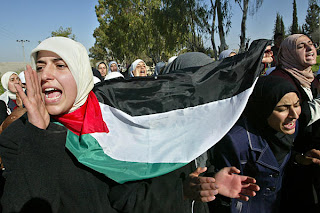 I was lucky enough to be invited to the Fletcher Summer Institute at Tufts this June, where we met the leader of the pretty much nonviolent movement to save the small Palestinian town of Budrus from bifurcation by the Separation Wall, an Israeli project futilely designed to gain security for stolen lands by walling off sections of the Palestinian portion of the West Bank. Earlier this month, the Christian Science Monitor asked in an article if the Budrus model was still viable.
I was lucky enough to be invited to the Fletcher Summer Institute at Tufts this June, where we met the leader of the pretty much nonviolent movement to save the small Palestinian town of Budrus from bifurcation by the Separation Wall, an Israeli project futilely designed to gain security for stolen lands by walling off sections of the Palestinian portion of the West Bank. Earlier this month, the Christian Science Monitor asked in an article if the Budrus model was still viable.They looked at various Palestinian villages and pointed out that the Israeli Defense Force was more active than ever and that other villages had not managed to replicate the Budrus success in rerouting the Wall. But the idea that this model will prove replicable is not credible when one looks at the film Budrus and notes that the "nonviolent" resistance included rock throwing by young men. This means the Budrus model is doomed.
One Israeli soldier was hospitalized in Bilin, another village that many leftwingers are touting as a purely nonviolent struggle. Getting hit in the head by a rock is violence. Period. The standard response that, well, those IDF soldiers have all the weapons and really are the violent ones is hogwash now and was hogwash when it was first claimed, as it so often is. To make the claim that relatively minor violence committed by the overmatched violent force in an asymmetric conflict equates to nonviolence is ignorant or disingenuous--false in either case.
To understand why and how a conflict method might work requires honesty, not partisanship. Believing that one side is entirely just and the other side is entirely unjust is a person's prerogative, but to allow that to color interpretations of what nonviolence might be is incorrect analysis.
In the end, we are still waiting for "The Palestinian Gandhi." Or the Palestinian MLK, or the Palestinian Cesar Chavez, or the Palestinian Dorothy Day. We are waiting for that person to emerge as a publicized leader of a disciplined nonviolent movement, something we haven't seen in Palestine and which guarantees that Israel will continue to justify what most of the world recognizes as unjust occupation of land that doesn't belong to them. If the strict nonviolence of
 Ali Abu Awwad or Mazin Qumsiyeh is adapted by actual movement of Palestinians, they have a chance for success.
Ali Abu Awwad or Mazin Qumsiyeh is adapted by actual movement of Palestinians, they have a chance for success. Is this fair? Of course not; conflict forensics is not about who is on the side of justice more than another party. It is about deconstructing the dynamics of conflict and making professional observations, which is what I am doing in this case. Yes, making long-distance judgments about what might work and what might not are not brave, nor are they always accurate. Conflict science is not about being a radical; it is about trying to be accurate, which, one hopes, is helpful to some.
Here's hoping Mazin
 and other Palestinians who eschew stone throwing, not to mention bombing and sniping, are listened to and emulated so we can see movements that succeed more often in Palestine. You cannot reach hearts and minds by hitting people in the head with rocks any more than Israel can gain any friends by such massive criminal enterprises as Operation Cast Lead two years ago, which killed some 1,400 Palestinians, far out of proportion to the violence of Hamas then and now.
and other Palestinians who eschew stone throwing, not to mention bombing and sniping, are listened to and emulated so we can see movements that succeed more often in Palestine. You cannot reach hearts and minds by hitting people in the head with rocks any more than Israel can gain any friends by such massive criminal enterprises as Operation Cast Lead two years ago, which killed some 1,400 Palestinians, far out of proportion to the violence of Hamas then and now.Israel v Palestine: First one to adhere to absolute nonviolence wins. This is completely counterintuitive in both societies and it's closer to the truth than what the leadership of either society demonstrates.



No comments:
Post a Comment